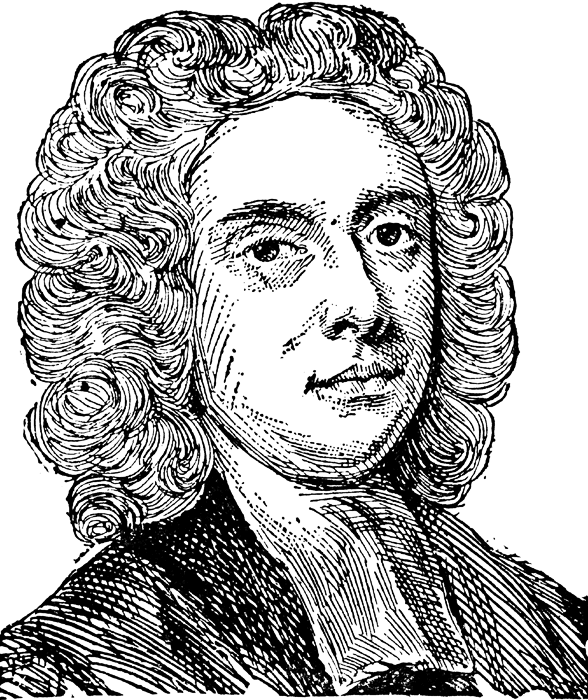Quotes, Jokes and Anecdotes
by David & Linda White
|
The Best Known Passages from Butler
|
|
- "Language is, in its very nature, inadequate, ambiguous, liable to infinite abuse, even from negligence; and so liable to it from design, that every man can deceive and betray by it." - Analogy of Religion, II.iii.8
- "I express myself with caution, lest I should be mistaken to vilify reason; which is indeed the only faculty we have wherewith to judge concerning anything." - Analogy of Religion, II.iii.1
- "All reasonable men know certainly, that there cannot, in reality, be any such thing as chance; and conclude, that the things which have this appearance are the result of general laws, and may be reduced into them." - Analogy of Religion, II.iv.4
- "There are as real and the same kind of indications in human nature, that we were made for society and to do good to our fellow- creatures; as that we were intended to take care of our own health and private good." - Fifteen Sermons, I.5
- "That mankind is a community, that we all stand in a relation to each other, that there is a public end and interest of society which each particular is obliged to promote is the sum of morals." - Fifteen Sermons, IX.8
- "What a wonderful incongruity it is for a man to see the doubtfulness in which things are involved, and yet be impatient out of action, or vehement in it!" - Fragment 6
- "To us, probability is the very guide to life." - Analogy of Religion, Introduction § 3
- "As I design the search after truth as the business of my life, I shall not be ashamed to learn from any person." - Letters to Clarke, IV.3
- "That which is the foundation of all our hopes and of all our fears; all our hopes and fears which are of any consideration; I mean a Future Life." - Analogy of Religion, Introduction § 13
- "The first thought is often the best." - Fifteen Sermons, VII.14
- "Virtue must be the happiness, and vice the misery of every creature." - Analogy of Religion, Introduction § 10
- "It has come, I know not how, to be taken for granted, by many persons, that Christianity is not so much as a subject of inquiry; but that it is, now at length, discovered to be fictitious." - Analogy of Religion, Advertisement
- "That your conscience approves of and attests to such a course of action, is itself alone an obligation." - Fifteen Sermons III.5.
- "Christianity is a scheme quite beyond our comprehension." - Analogy of Religion, II.iv.2
Anecdotes about Butler
Biographical Anecdotes
"Sir, the pretending to extraordinary revelation and gifts of the Holy Ghost is a horrid thing, a very horrid thing."
-- To John Wesley
"Why might not whole communities and public bodies be seized with fits of insanity, as well as individuals? Nothing but this principle, that they are liable to insanity, equally at least with private persons, can account for the major part of those transactions of which we read in history."
-- The Tucker Anecdote
Commendations
Commendations
"[Coleridge] considered Bishop Butler as a true philosopher, a profound and conscientious thinker, a genuine reader of nature and his own mind. He did not speak of his Analogy, but of his Sermons at the Rolls' Chapel, of which I had never heard. Coleridge somehow always contrived to prefer the unknown to the known. In this instance he was right. The Analogy is a tissue of sophistry, of wire-drawn, theological special-pleading; the Sermons (with the preface to them) are in a fine vein of deep, matured reflection, a candid appeal to our observation of human nature, without pedantry and without bias."
- Hazlitt's "My First Acquaintance with Poets." The Liberal, April, 1823
"Opportunities come; we do not perceive them, or we tarry or hesitate, and they pass away. Often it happens, too, that a lost opportunity is a last opportunity! The greatest thinker of the English whose writings are, in these troublous times and in the midst of the many controversies of the day, if one will study them, a comfort and a help both for what they give- the great Bishop Butler, when the rector of a country parish in England, placed a sun-dial on the tower of his church with the legend on it, 'Ut hora sic vita'— As is the hour, so is the life.'"
- James de Koven, "Lost Opportunities," preached 1878, printed in Sermons Preached on Various Occasions, 1880. Full text posted by Project Canterbury.
"Some years ago, when I was considering an invitation to accept the incumbency of St. Paul's, Dundee, I happened to be staying in the same house with the Bishop [of Lincoln]. Young as I then was, it was not without uneasiness that I contemplated the pastoral relations with individual souls, into which the acceptance of such a charge would bring me, and it was suggested that I should avail myself of the Bishop's acknowledged mastery of spiritual counsel by consulting him in the matter. Dreading lest some curious book of foreign casuistry might be recommended to my study, I entered upon the interview with some misgiving. But with so true a son of the English Church as Edward King there was no cause for alarm. He just looked at me with that sweet smile of his, and said quite simply, 'Don't try to be too good, and read Butler's Analogy.' The first piece of advice was a caution against the use of spiritual stilts, the second was an encouragement to approach every difficulty in the spirit of a sound British commonsense."
- J. G. Simpson in the preface to his Preachers and Teachers (London: Edward Arnold, 1910).
Butler Jokes
T H Robinson was Professor of Philosophy and Logic. One of the books we had to study was Bishop Butler's Sermons, a very heavy dull book. My copy had been handed down through several generations of students, so it was very tattered and had long since lost its cover. On the fly-leaf some previous student had written:
T H Robinson was Professor of Philosophy and Logic. One of the books we had to study was Bishop Butler's Sermons, a very heavy dull book. My copy had been handed down through several generations of students, so it was very tattered and had long since lost its cover. On the fly-leaf some previous student had written:
If there should be another flood,
For refuge hither fly
For though the world should be submerged
This book will still be dry!
For refuge hither fly
For though the world should be submerged
This book will still be dry!
Professor Robinson had formerly been Minister of Railway Street, Lisburn. It was a strange coincidence that one day I would follow him as Minister there - but I never tried to preach one of Bishop Butler's sermons!
Through Changing Scenes: Recollections of Life And Ministry in the 20th Century by Howard Cromie
Through Changing Scenes: Recollections of Life And Ministry in the 20th Century by Howard Cromie


